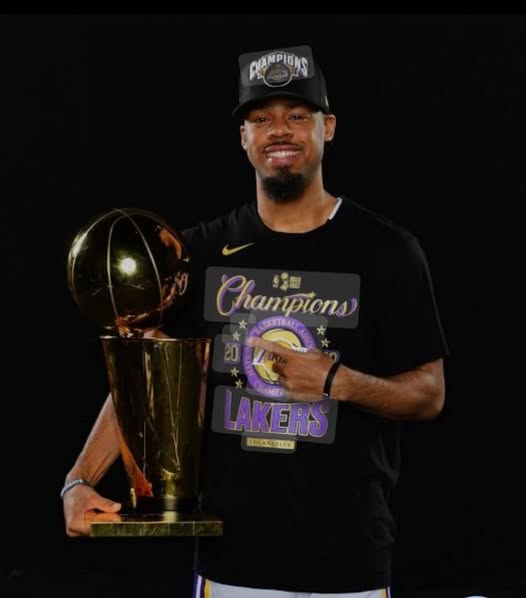In a move that has electrified the Duke basketball community, the Blue Devils have officially hired former national champion and NBA veteran Quinn Cook as their new Director of Player Development. For Cook, it’s more than just a professional opportunity—it’s a deeply emotional homecoming to a program that helped shape his basketball identity. For Duke, it’s a strategic addition meant to fuse its storied past with its ambitious present and future. As the college basketball landscape continues to evolve, this reunion between Cook and the program he once led as a floor general carries immense symbolic and practical weight.
Quinn Cook is no stranger to the bright lights of Cameron Indoor Stadium. A former McDonald’s All-American out of Oak Hill Academy, Cook committed to Duke in 2011 and quickly made his mark on the program with his maturity, leadership, and poise under pressure. Over four years in Durham, he grew from a talented but inconsistent guard into one of the most dependable leaders on a team that went on to win the 2015 NCAA Championship. As a senior captain during that title run, Cook was the heartbeat of a squad that featured future NBA stars like Jahlil Okafor, Tyus Jones, and Justise Winslow. Though the freshmen garnered headlines, Cook’s leadership and experience were indispensable.
Now, almost a decade later, Cook returns to Duke not as a player but as a mentor and guide. His role as Director of Player Development places him in a pivotal position on Jon Scheyer’s staff. He will be responsible for helping young Blue Devils grow both on and off the court—nurturing their basketball skills, professional readiness, and personal growth. Cook’s unique experience as a four-year college player who transitioned successfully to the NBA makes him particularly well-suited for the role. He understands the journey, the pressure, and the discipline required to thrive at Duke and beyond.
For head coach Jon Scheyer, this hire is as personal as it is strategic. Scheyer and Cook represent two eras of Duke basketball defined by tough-minded leadership and competitive fire. Both won titles, both stayed at Duke for four years, and both have long been viewed as culture carriers within the program. Scheyer, now in his third year at the helm after taking over for Mike Krzyzewski, has made it clear he values staff members who embody Duke’s values. In Cook, he has found someone who knows those values innately and has lived them on the court.
The move also underscores a growing trend in college basketball: programs turning to their own alumni to fill key development roles. This strategy isn’t just sentimental—it’s smart. Players like Cook bring instant credibility with current athletes. They’ve walked the same campus, trained in the same gyms, and faced the same pressures. Their advice is grounded in experience, not theory. When someone like Cook speaks, players listen—not just because of his NBA credentials, which include two NBA championships (with the Golden State Warriors in 2018 and Los Angeles Lakers in 2020), but because of his authenticity and relatability.
Beyond Xs and Os, Cook’s presence is expected to impact Duke’s recruiting narrative. In a world where NIL deals and transfer portals dominate headlines, programs are seeking new ways to differentiate themselves. Duke can now point to Cook as a real-life example of the full-circle journey—from elite recruit to college star to pro, and now, back as a mentor. For top high school prospects and their families, the message is clear: Duke takes care of its own. This kind of continuity resonates in a recruiting environment that often feels transactional.
Cook’s own journey to this point is filled with resilience, sacrifice, and perseverance—qualities that make him a compelling figure to lead development efforts. After going undrafted in 2015 despite a stellar college career, Cook bounced between the NBA G-League and several franchises before cementing his place in the league. His perseverance paid off, not only in championships but in the respect he earned across the basketball world as a consummate professional and locker room leader. That resilience, coupled with his love for the game and deep emotional connection to Duke, will likely serve as a foundation for the way he approaches this new role.
For many Duke fans, seeing Cook back in the fold is emotional. He was never the flashiest player, but he was always the glue—the type of teammate and leader that championship programs are built around. His ability to balance humility with competitiveness endeared him to coaches, teammates, and fans alike. Now, he’ll bring that same spirit to a new generation of Blue Devils, many of whom may not fully understand just how important Cook was to the program’s modern success.
There is also a symbolic passing of the torch at play. As Duke transitions into a new era under Scheyer, hiring Cook represents a bridge between generations. The Krzyzewski legacy is still deeply embedded in the DNA of the program, and players like Cook—who were mentored directly by Coach K—serve as vessels of that wisdom. Cook will undoubtedly draw on lessons from his time under Krzyzewski, while also helping Scheyer shape a vision that is distinctly his own. The balance of honoring tradition while innovating for the future is delicate, but with leaders like Cook and Scheyer at the helm, Duke appears to be threading that needle with precision.
The hire also reaffirms the broader mission of what college athletics is supposed to be about—development. In an age where college basketball often feels like a stopover on the way to the pros, Cook’s appointment sends a powerful message: growth matters. Character matters. Leadership matters. It’s not just about putting points on the board; it’s about preparing young men for life. Cook’s story, which includes heartbreak, triumph, setbacks, and success, is a living testament to that mission.
From a practical standpoint, Cook will have his work cut out for him. Duke’s roster is always loaded with talent, but molding that talent into a cohesive unit requires more than just coaching. It requires trust, mentorship, and example-setting—all things Cook is equipped to provide. Whether it’s working individually with a player on shooting consistency, helping them handle off-court pressures, or simply being a sounding board during tough stretches, his role will be multi-faceted and vital.
The reaction from former teammates and the broader Duke basketball family has been overwhelmingly positive. Social media buzzed with excitement, with many alumni and fans celebrating the news as a “perfect fit.” Cook himself expressed deep gratitude, calling the opportunity “a dream come true” and vowing to give his all to help the next generation of Blue Devils succeed.
It’s also worth noting that this move comes at a critical juncture for Duke. After a solid start to the post-Coach K era, expectations remain sky-high. Scheyer has already shown he can recruit at an elite level and compete nationally. Now, as the program seeks to elevate itself even further, adding someone with Cook’s credibility and character could be a key piece to sustaining excellence.



